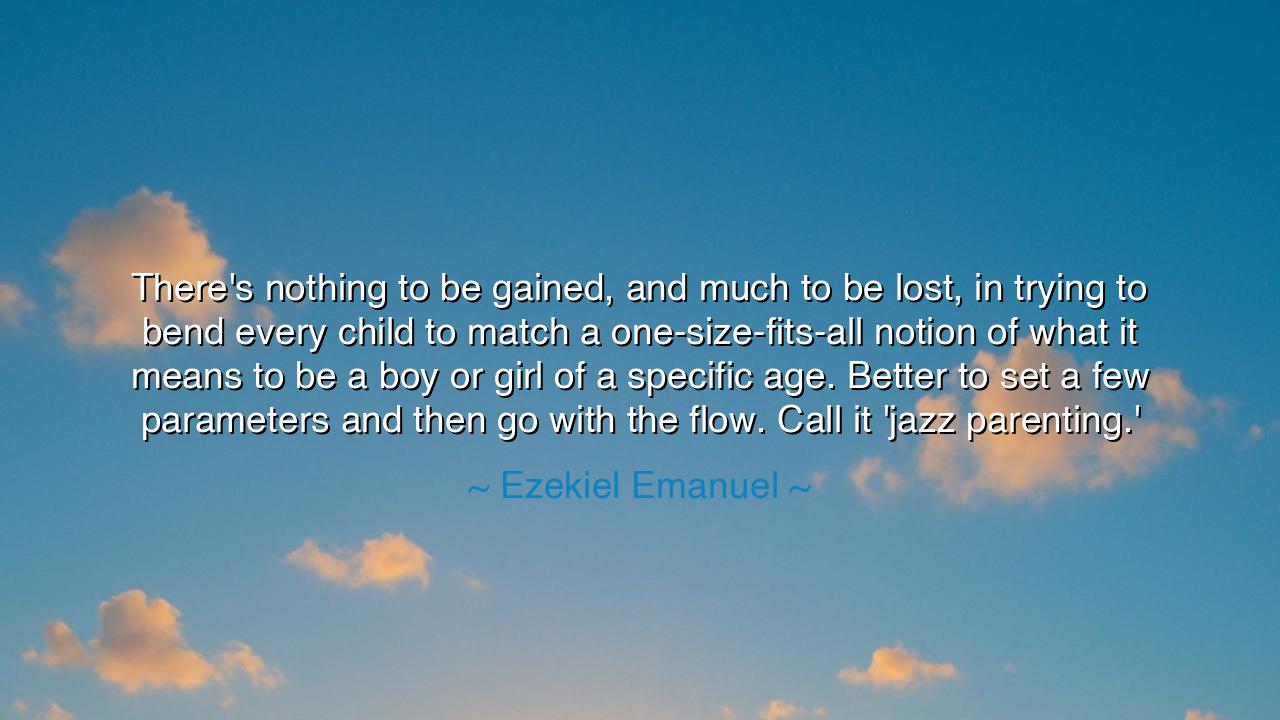
There's nothing to be gained, and much to be lost, in trying to
There's nothing to be gained, and much to be lost, in trying to bend every child to match a one-size-fits-all notion of what it means to be a boy or girl of a specific age. Better to set a few parameters and then go with the flow. Call it 'jazz parenting.'






Hear the words of Ezekiel Emanuel, who speaks with both reason and metaphor: “There’s nothing to be gained, and much to be lost, in trying to bend every child to match a one-size-fits-all notion of what it means to be a boy or girl of a specific age. Better to set a few parameters and then go with the flow. Call it ‘jazz parenting.’” In this phrase, he tears away the rigidity of tradition and invites us into a freer, wiser vision of parenting—one that moves not like a march, fixed and unyielding, but like jazz, alive with improvisation, rhythm, and harmony.
For too long, children have been forced into molds. Cultures have declared, “At this age, a boy must be this,” or, “A girl must act thus.” But Emanuel calls such demands a loss, not a gain, for they suffocate the unique spark within each child. To bend a child to one-size-fits-all rules is to silence the music of their individuality, to demand they play only the notes on the page, never their own variations. Jazz parenting, by contrast, honors the soul of the child, setting a foundation of values, yet leaving room for freedom, surprise, and the creative unfolding of personality.
The ancients themselves wrestled with this balance. In Sparta, children were raised under harsh uniformity, all bent to the same pattern of discipline, obedience, and strength. The system produced warriors, yes—but it also stifled diversity, crushing those who did not fit the mold. Meanwhile, in Athens, education was freer, with space for philosophy, art, and debate. The Athenians trusted that greatness could emerge in many forms. Emanuel’s jazz parenting echoes more of Athens than Sparta: it trusts that children flourish not when they are all the same, but when they are guided within broad parameters, then allowed to improvise their own song.
History offers us a tale of improvisation in the life of Benjamin Franklin. His father once intended him for the clergy, as was common for sons of his age. But Franklin’s restless curiosity could not be confined to that narrow role. Instead, his parents allowed him to pursue printing, writing, invention, and ultimately statesmanship. Their willingness to “go with the flow,” to adjust rather than break him, gave the world a mind of rare brilliance. This is the power of jazz parenting—not forcing a child to follow one rigid path, but nurturing their growth within a structure that allows freedom to innovate.
Emanuel’s metaphor of jazz is no accident. For jazz is music born of both discipline and freedom. It demands practice, awareness, and knowledge of structure, yet its beauty lies in the spaces where musicians break from the score, weaving new melodies from their own souls. So it must be with parenting: values and boundaries must be taught, for without structure, chaos reigns. But within that structure, parents must allow their children to surprise them, to stumble into unexpected notes, to become more than what any rulebook could predict.
The lesson, then, is clear: do not bind your children to rigid molds, but do not abandon them to chaos either. Set parameters rooted in love, kindness, and respect, but allow freedom beyond those bounds. Trust that individuality is not a threat, but a gift. For each child is a different song, and when allowed to play in harmony with guidance, their music enriches not only their life but the life of the family, the community, and the world.
Therefore, let every parent who hears these words take action: practice jazz parenting. Guide your children with steady rhythm, but let them improvise their melody. Celebrate their uniqueness, resist the urge to compare them to others, and let their individuality shine. By doing so, you will not only raise children who are strong and independent, but also children who are joyful, authentic, and deeply alive.
Thus Ezekiel Emanuel’s words carry the wisdom of the ancients in modern form: parenting is not about bending the child to the mold, but about guiding them within the rhythm of love, while letting them play the music of their soul. This is the art of jazz parenting, and it is as timeless as the human heart itself.






AAdministratorAdministrator
Welcome, honored guests. Please leave a comment, we will respond soon